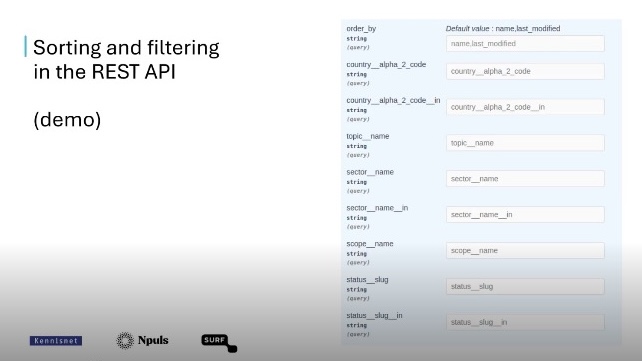Iteration 4: Highlights
Advancing EduXS Towards the MVP
On Thursday, 14 November 2024, the fourth iteration demo of the EduXS project took place, showcasing the progress towards our Minimum Viable Product (MVP), set for completion by the end of this year. This milestone marks significant advancements in both back-end and front-end functionalities, ensuring a robust foundation for the platform’s long-term vision. Here is an overview of the demo highlights.
- Demo Back End
- Authentication improvements
The authentication system now supports SRAM (sram.surf.nl), enabling specific individuals to join and collaborate securely. This approach aligns with our goal of targeted group collaboration rather than open organisation-wide access. SRAM’s compatibility with the SAML protocol and our Baserow implementation has been ensured, resolving earlier technical issues through collaboration with the Baserow development team.
- Sorting/filtering via the API
New API enhancements allow sorting data by name or last modified date and filtering by country, sector, or other attributes. These features improve data management and accessibility for developers and front-end users alike.

- Grouping calls
A batching feature has been introduced to streamline API efficiency. By grouping heterogeneous entities in a single call, the platform supports faster data retrieval, which is particularly useful for building complex visualisations like relationship trees.
- Search optimisation
Improvements to search functions ensure precise and flexible queries, enhancing user experience and system performance when dealing with large datasets.
- Demo Front End
- Improved User Navigation and Filtering
The front-end now reflects back-end capabilities such as sorting and filtering. Users can filter collaborations by country and compare selected entries directly. These features simplify finding and sharing information, with comparison lists sharable via direct links.
- Enhanced Relationship Views
The relationship view now allows users to navigate entity connections seamlessly. This is particularly valuable for professionals seeking an overview of collaborations or projects related to specific organisations or topics.
- Interactive Demonstration Use Cases
The demo highlighted potential real-world applications, such as presenting at conferences. For example, German colleagues interested in credentials could explore related topics, collaborations, and standards through the relationship view. This iterative feedback loop fosters practical improvements and aligns the platform with user needs.
- Author Guidelines: A First Step
To ensure high-quality and consistent contributions, the first version of the author guidelines was introduced. This practical, three-page guide provides:
• General writing principles and quality assurance references.
• A clear explanation of the EduXS model entities (e.g., collaboration, organisation).
• A checklist to ensure all relevant information is accurately documented.
These guidelines will evolve based on feedback from contributors and the expert groups being convened in the coming months.
- What's Next?
As we approach the final iteration for 2024, the focus will shift to:
• Completing the technical migration to SDP (Surf Developer Platform) and prepare for the production phase of EduXS.
• Implementing additional navigation enhancements for the front-end and the related back end functionality.
• Taking initial steps towards establishing the future governance structure by convening the Board of Directors and the Expert Group, followed by engaging the Advisory Board at a later stage.
The next demo will take place on Thursday, 12 December, at 16:30. We encourage you to join and see how EduXS is shaping the future of digital transformation in education. Send an email to info@eduxs.eu and we will send you an invitation link.
